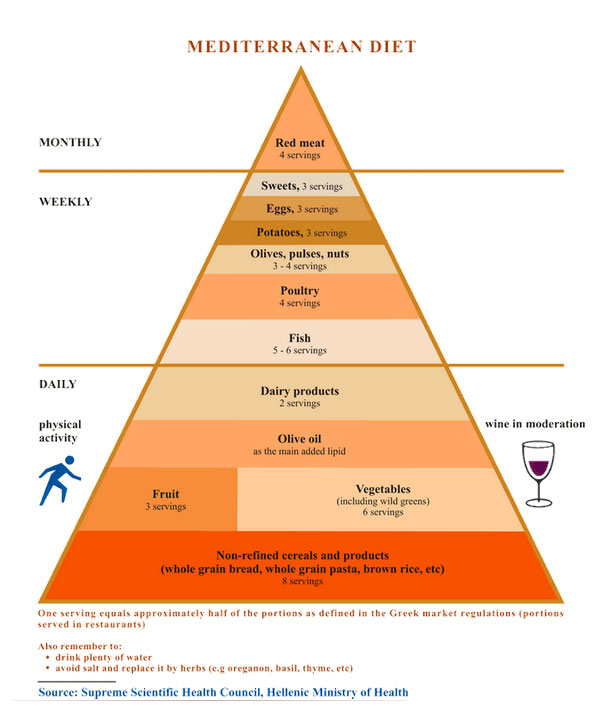DIETARY GUIDELINES FOR ADULTS IN GREECE
HELLENIC MINISTRY OF HEALTH
Supreme Scientific Health Council 1999
SUMMARY

It has become customary to represent food-based dietary guidelines (FBDG) in the form of a triangle (“pyramid”), the base of which refers to foods which are to be consumed most frequently and the top to those to be consumed rarely, with the remaining foods occupying intermediate positions. In the food pyramid, frequencies rather than exact quantities in grams are indicated, because most consumers think in this way about the foods they consume. Consideration of frequencies, however, implies a standardized portion size, multiples of which are to be consumed. These portions have been variously termed “servings” or, when foods of similar origin or composition are considered, “equivalents”.
A total of about 22 to 23 servings are to be consumed daily, in three or four meals. In a rough approximation, a serving equals one half of the portions as defined in the Greek market regulations (approximately half the quantity served in a Greek restaurant). So, one serving is equal to:
• one slice of bread (25g)
• 100 g potatoes
• half a cup (i.e. 50-60 g) of cooked rice or pasta
• a cup of raw leafy vegetables or half a cup of other vegetables, cooked or chopped (i.e. ~ 100 g of most vegetables)
• one apple (80 g), one banana (60 g), one orange (100 g), 200 g of melon or watermelon, 30 g of grapes
• one cup of milk or yogurt
• 30 g of cheese
• 1 egg
• ~ 60 g of cooked lean meat or fish
• one cup (i.e. 100 g) of cooked dry beans
The guidelines should be complemented with simple, common sense advice:
(It is worth to mention some additional information:)
• Do not exceed the optimal body weight for your height
• Eat slowly, preferably at regular times during the day and in a pleasant environment
• Prefer fruits and nuts as snacks, instead of sweets or candy bars
• Prefer whole grain bread or pasta
• Always prefer water over soft drinks
• Healthy adults, with the exception of pregnant women, do not need dietary supplements (vitamins, minerals, etc.) when they follow a balanced diet
• Light foods are not a substitute for physical activity when it comes to controlling excess body weight; furthermore, their consumption in high quantities has been shown to promote obesity
• Although the indicated model diet is the ultimate goal, gradual adoption may be more realistic for some people
For the detailed text of dietary guidelines for adults in Greece press HERE.
|




